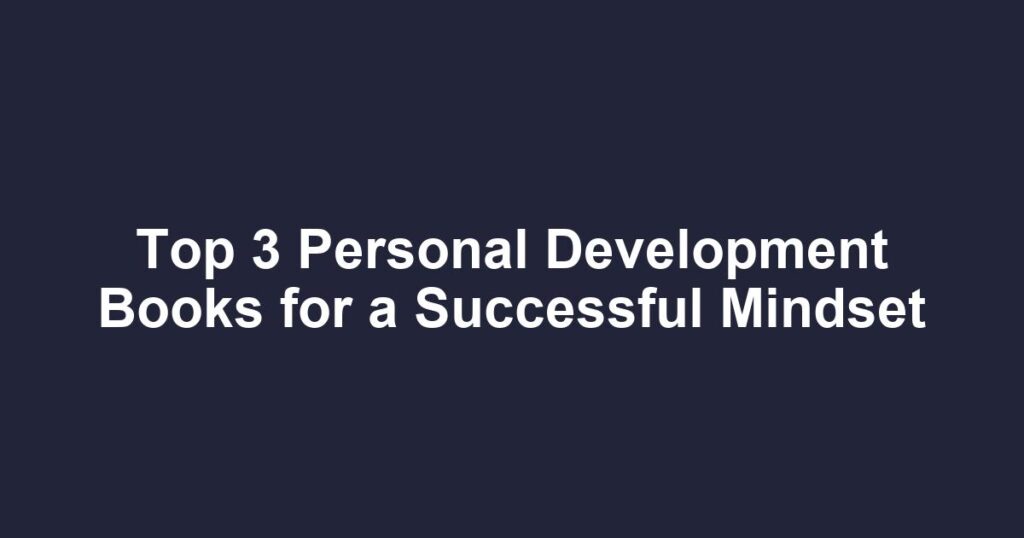Top 3 Personal Development Books for a Successful Mindset
In today’s fast-paced world, having a success mindset is more important than ever. Personal development books have the power to inspire and equip you with the tools needed to navigate life’s challenges and foster a successful mindset. Whether you want to improve your career, relationships, or overall happiness, the right self-help books can provide valuable insights and guidance.
In this article, we’ll explore the top three personal development books that can help you cultivate a successful mindset. These resources have been chosen for their proven strategies and relatable content, making them excellent choices for anyone looking to enhance their personal growth journey.
1. “Mindset: The New Psychology of Success” by Carol S. Dweck
Dr. Carol S. Dweck’s “Mindset” is a groundbreaking work that examines the role of mindset in achieving personal and professional success. The book categorizes mindsets into two types: fixed and growth. Understanding your mindset is the first step in fostering a successful mindset that leads to growth and achievement.
Key Concepts
- Fixed Mindset: Believing that your abilities and intelligence are static.
- Growth Mindset: The belief that skills and intelligence can be developed through dedication and hard work.
Dweck emphasizes that adopting a growth mindset leads to resilience, a willingness to learn from failures, and the persistence needed to overcome obstacles. This book encourages readers to embrace challenges as opportunities for growth, which is essential for personal development.
Why You Should Read “Mindset”
- Gain insights into how your mindset influences your path to success.
- Learn strategies for reprogramming your thinking.
- Find relatable examples of how mindset affects life outcomes.
2. “The 7 Habits of Highly Effective People” by Stephen R. Covey
Stephen R. Covey’s “The 7 Habits of Highly Effective People” is a timeless classic in the personal development arena. This book introduces a principle-centered approach for solving personal and professional problems. Covey outlines seven habits that are essential for effective living and achieving a success mindset.
Overview of the 7 Habits
- Be Proactive: Take responsibility for your life and choices.
- Begin with the End in Mind: Define a clear vision for your future.
- Put First Things First: Prioritize tasks that align with your goals.
- Think Win-Win: Foster mutual benefit in relationships.
- Seek First to Understand, Then to Be Understood: Practice empathetic communication.
- Synergize: Collaborate effectively with others.
- Sharpen the Saw: Focus on continuous self-improvement.
This book is widely celebrated for its actionable advice and principles that can transform personal and professional effectiveness. By integrating these habits into daily life, you can develop a success mindset that propels you toward your goals.
Benefits of Reading “The 7 Habits of Highly Effective People”
- Discover how to align your actions with your core values.
- Achieve personal and professional goals effectively.
- Enhance your interpersonal skills and relationships.
3. “Atomic Habits” by James Clear
James Clear’s “Atomic Habits” is a must-read for anyone interested in understanding the power of small, consistent changes. Clear introduces the concept of atomic habits, which are tiny, incremental changes that accumulate over time, leading to remarkable results. This book is especially useful for those looking to foster a success mindset through personal development.
Core Principles of Atomic Habits
- The 1% Rule: Improving by just 1% each day creates significant changes over time.
- Four Laws of Behavior Change: Make it obvious, attractive, easy, and satisfying.
- The Habit Loop: Understand the cues, cravings, responses, and rewards that drive your habits.
Clear provides readers with practical strategies for building good habits and breaking bad ones. By applying the principles from “Atomic Habits,” you can take actionable steps to create lasting change, embodying a success mindset.
Why “Atomic Habits” is Essential Reading
- Learn how small changes can lead to huge results.
- Discover practical steps to build better habits.
- Understand the psychology behind habit formation.
Putting What You Learn into Practice
Reading personal development books is a great start, but putting the insights into practice is where the real growth happens. Here are some practical tips to help you implement the ideas from these books:
Tips for Successful Implementation
- Set Clear Goals: Define specific, measurable, achievable, relevant, and time-bound (SMART) goals based on your readings.
- Create a Habit Tracker: Use a journal or app to track your progress and stay accountable to your new habits.
- Engage in Regular Reflection: Set aside time to reflect on your growth and adjustments you need to make.
- Join a Community: Surround yourself with like-minded individuals who support your personal development journey.
Common Questions About Personal Development
- How to Start with Personal Development? Begin with self-awareness and identify areas for improvement.
- What are the Best Practices for Self-help? Continuously evaluate your goals, habits, and mindset.
- Why does mindset matter? A positive and growth-oriented mindset can lead to better outcomes in life.
Conclusion
Investing in personal development through books can dramatically shift your perspective and approach to life. By incorporating the teachings from “Mindset,” “The 7 Habits of Highly Effective People,” and “Atomic Habits,” you can cultivate a success mindset that empowers you to achieve your goals. Remember, the journey of personal development is ongoing, and taking actionable steps is key.
Are you ready to begin your journey toward a successful mindset? Start by picking one of these books and applying its concepts in your everyday life. Your future self will thank you!
Meta Description: Discover the top 3 personal development books to cultivate a success mindset, featuring insights from “Mindset,” “The 7 Habits of Highly Effective People,” and “Atomic Habits.”

